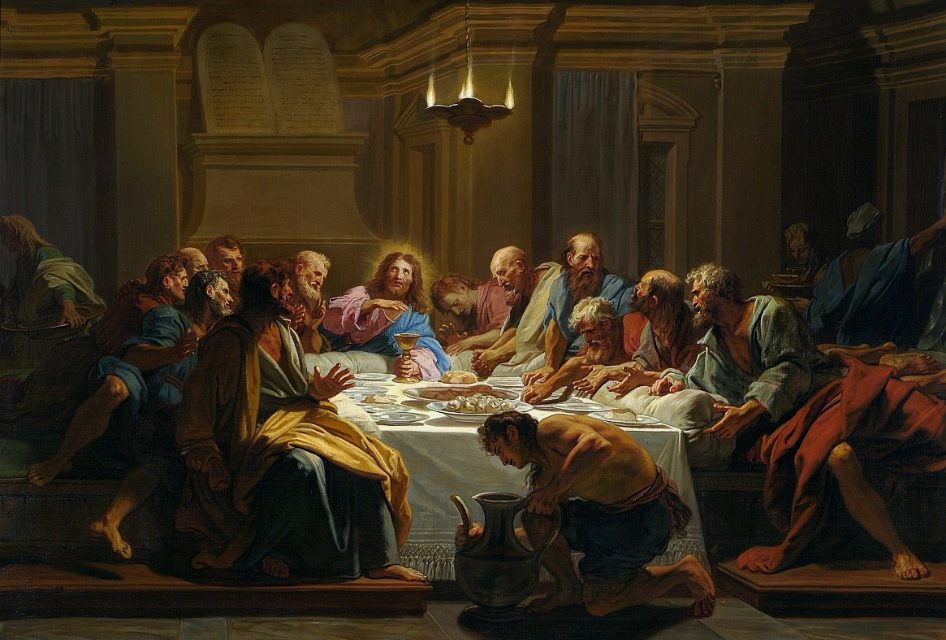I’ve always thought how great it would be to have the sacrament as they did in the days of Jesus or the days of Joseph Smith. In a sacrament meeting today, you sit on a bench in the chapel, waiting for the tray of little torn pieces of bread and thimble-sized cups of tap water to be passed down the row. For the Savior and in the early days of the LDS church, the sacrament was more of a supper. It was not a token piece of bread and water. People ate and drank “until they satisfied their appetites.” (ref)
George Q Cannon, a member of the First Presidency and editor of the early church newspaper (the Juvenile Instructor) explained:
At the Last Supper, at which the Savior Himself was present, the bread and the wine were not passed as is the custom now among us. In our church numerous instances have occurred where the Sacrament has been administered, in certain places, in the same way—that is, bread and wine (or water) have been partaken of as a meal, and not, as is usual when the Sacrament is passed in our general meetings, in the shape of small pieces of bread and a little sip of water.
This would be the proper manner to administer this ordinance now if circumstances permitted; but situated as the Church is, it is not convenient to administer the Sacrament in this manner, and therefore our present mode is the one that is sanctioned by usage and by permission of the Lord through His inspired servants. (George Q. Cannon, “Editorial Thoughts,” Juvenile Instructor, January 15, 1897, 52–53.)
In the history of the Church, Joseph Smith notes that on June 22, 1836, his father (Patriarch Joseph Smith Sr.) and his uncle, John Smith,
started on a mission to visit the branches of the Church in the Eastern States, to set them in order, and confer on the brethren their patriarchal blessings. I [Joseph] took my mother [LucyMack Smith] and Aunt Clarissa (my Uncle John’s wife,) in a carriage, and accompanied them to Painsville, where we procured a bottle of wine, broke bread, ate and drank, and parted after the ancient order, with the blessings of God. [History of the Church of Jesus Christ of Latter-day Saints, (2:31) Pg. 447]
It’s easy to miss the full meaning of the sacrament just because of the size of our congregations. Sometimes the formality and routine nature of the sacrament distracts us from paying attention and looking deeper. I understand the need for a routine prayer. In the early days of the church, the sacrament prayer was not verbatim.
This idea of an unscripted sacrament prayer was reflected in one of Brigham Young’s sermons after the migration to Utah. In his address, President Young stressed the importance of using the prescribed blessings in the Doctrine and Covenants, saying, “Take this book and read this prayer.” (ref)
Another thing — I realized that we all pass the sacrament — not just the deacons. We receive it from the person sitting next to us and pass it to the next person. (Yea, this is not a good idea during a pandemic.) But I do find it interesting that we don’t have to take the sacrament directly from a priest or deacon. Also, in the following text, the elder or priest kneels with the church (not just by himself):
It is expedient that the church meet together often to partake of bread and wine in the remembrance of the Lord Jesus; And the elder or priest shall administer it; and after this manner shall he administer it—he shall kneel with the church and call upon the Father in solemn prayer, saying:
O God, the Eternal Father, we ask thee in the name of thy Son, Jesus Christ, to bless and sanctify this bread to the souls of all those who partake of it, that they may eat in remembrance of the body of thy Son, and witness unto thee, O God, the Eternal Father, that they are willing to take upon them the name of thy Son, and always remember him and keep his commandments which he has given them; that they may always have his Spirit to be with them. Amen.
the manner of administering the wine—he shall take the cup also, and say:
O God, the Eternal Father, we ask thee in the name of thy Son, Jesus Christ, to bless and sanctify this wine to the souls of all those who drink of it, that they may do it in remembrance of the blood of thy Son, which was shed for them; that they may witness unto thee, O God, the Eternal Father, that they do always remember him, that they may have his Spirit to be with them. Amen. (D&C 20:76 – 79)
Since we are in throngs of the 2020 pandemic (Wuhan Corona Virus, also called Covid-19) you may have the opportunity to rethink the sacrament when you have it in your home. I guess at church, we can quickly contaminate the bread and water — from the priests who tear the bread with their hands to passing the trays hand to hand down the aisles, for everyone to breathe on and touch. Yea. But aside from the social distancing, we have the blessing to rethink what the sacrament means to us.


